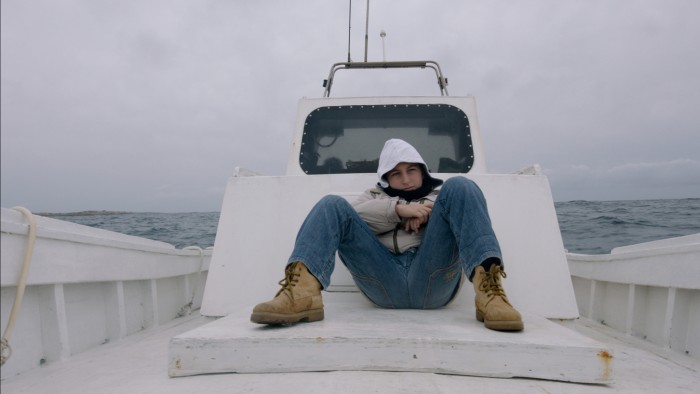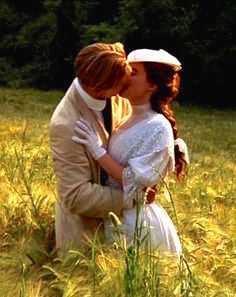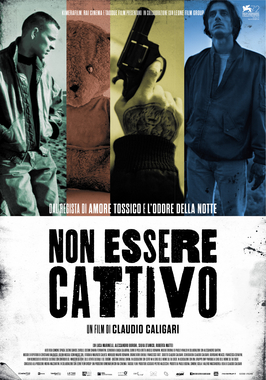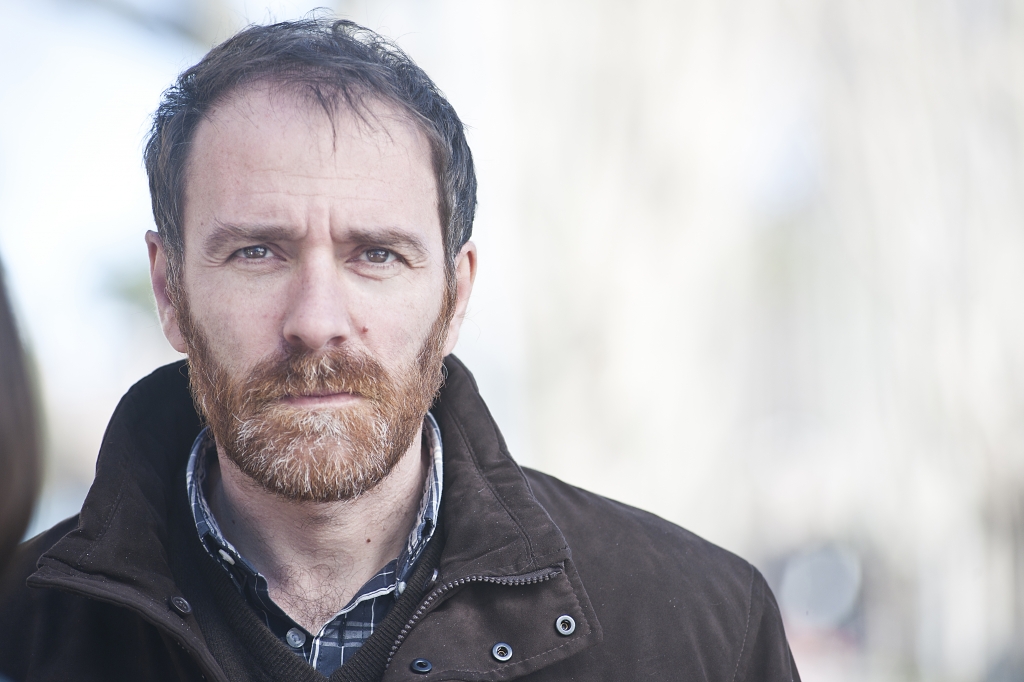Herewith three of the most distinctive films from TIFF. The only problem is: I'm not sure what I think of them. How often does that happen to you at the movies: walking out, unable to answer the question of "did I like it? was it good?" Some movies just refuse to settle quickly. Or, they're hard to parse in the film festival setting (due to seeing so many movies back to back). Which is to say that I'm going to need more time with each of these. All three are familiar and alien at once and, in their dissimilar ways, ambitious. All three are beautifully made... yet at this writing, I have trouble imagining the desire to watch any of them a second time. (Well, no. I'd like to see Youth again)
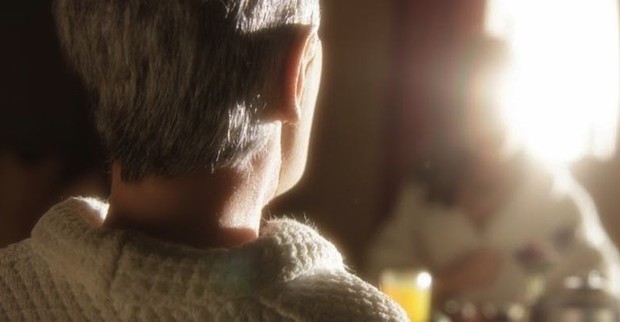
ANOMALISA (Duke Johnson & Charlie Kaufman, US)
Though I was a critical holdout on the oft revered miserabilist Synecdoche New York -- in which I learned that I most definitely prefer Kaufmann as a screenwriter than as a director -- I was eager to see this. That anticipation was partially for the novelty aspects. It's a stop motion film with many characters but with only three voice actors. The similar voices serve the plot in an obvious conceptual way when you're watching it (which I won't spoil) but they also indirectly expose the monotony and limits of a singular POV and male gaze, in this case Kaufmann's. The story involves a gray-haired customer service guru of some reknown, deeply unhappy and ready to cheat on his wife during a one night stay in a Cincinatti hotel. There are a few indisputably grand jokes, some stale ones (hotel room keys that don't work. hahaha) and moving beats within the discomfort and laughter. There's even a Jennifer Jason Leigh singing Cyndi Lauper sequence that's sublime. But there's also a feeling of "and...?" about the whole effort and even "why is this animated?" since it only becomes surreal a couple of times. At only 90 minutes this is stretched thin, given that some of the sequences play out in what painfully feels like real time like the businessman's cab to and check in at the hotel. I'm mystified by the "MASTERPIECE!" excitement around it but Kaufman's work is always worth mulling over.
[Crass Oscar Note as I'm sure Kaufman had no interest in Oscars when he was making this: the critical hosannas Anomalisa was greeted with followed by the news that it would Oscar qualify this year led a lot of armchair pundits to think Inside Out suddenly has real competition for the Animated Oscar. That is not the case. This is too strange and dispiriting and even too dull to take the gold though the critical reception could certainly help it to a nomination if they'd like to acknowledge that animation isn't only for kids -- this one is entirely for adults given its themes and the animated sex scenes.]
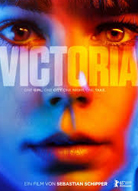 VICTORIA (Sebastian Schipper, Germany)
VICTORIA (Sebastian Schipper, Germany)
Victoria (Laia Costa) is a lonely barista from Spain who has spent three months in Berlin. She still doesn't know anyone when one night out dancing she meets drunk but charming Sonne (Frederick Lau) and three of his drunk up-to-no-good friends. Thus begins an unbroken 132 minute long continuous shot as we follow Victoria in real time through her inebriated misadventures. Schipper, who started as an actor (he's in many of Tom Tykwer's films), gets natural work from his entire cast who are all speaking rough English since that's their only common language. You truly feel like you're there with Victoria and her new friends on a neverending night you know you'll always remember. Or you'll hope to forget; parties can't last forever and one foolish decision can lead to another and another and soon you're in way too deep. Schipper and his technical team deserve all the praise they've received for this absolute technical triumph -- not only was the film all shot in one take, it's pulled off without a visible hitch, and it feels artful but effortless too since there are well timed musical breaks of one sort or another (including a phenomenal piano scene) and the lack of cuts only escalates the tension. The film has an inexorable energy since you don't feel you can escape. You're with Victoria and her German buddies until the end. But do you want to be? This is a grueling sit from the tension and eventual violence and the two hour plus running time so it's hard to imagine watching it a second time. Still, immersive film experiences like this are all too rare.
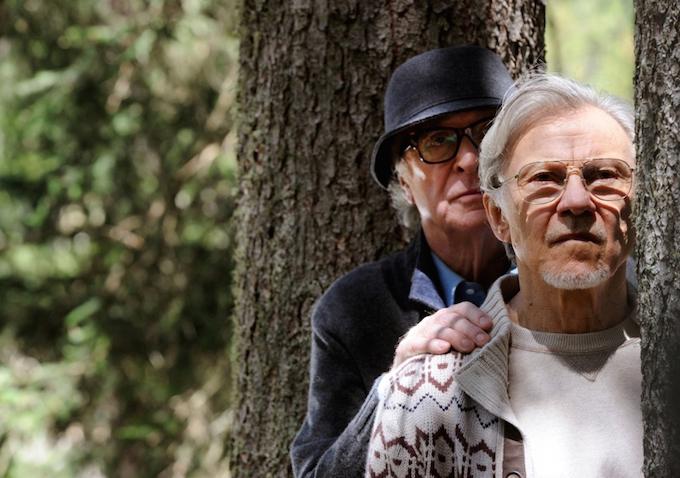 Caine and Keitel spy on a tryst in the woods
Caine and Keitel spy on a tryst in the woods
YOUTH (Paolo Sorrentino, Italy)
An easier sit than Sorrentino's Oscar winning The Great Beauty but then it is half as long! Like that film, this one features amazing gilded tableaus and wealthy lost souls. We also get sharp performances from well loved Oscar-winners (Michael Caine, Jane Fonda, Rachel Weisz) and movie troupers (Harvey Keitel and Paul Dano), all of them getting at least one showcase moment. Youth has some truly vivid sequences / images but does it all cohere? I'm not sure that it does: It's covering a lot of ground very quickly and its many diversions, both fanciful, humorous, or sad are highly uneven. At a hotel/spa retreat for the rich and famous, the characters all come together: Caine is a retired legendary composer staving off requests to conduct again with his personal assistant daughter (Weisz); Dano (in a strange bit of casting) plays a sad movie star who hates his fans and the film he's best known for; Keitel is a famous director whose work is not what it used to be. Jane Fonda appears in a much-showcased cameo as a legendary movie star diva. (That the movie is about aging showbiz types certainly won't hurt its Oscar chances given the Academy's demographics). Sorrentino seems to be borrowing from Fellini again and a friend of mine groaned about a scene involving a telescope in which Keitel pontificates on the different between youth and old age -- but I personally loved the scene. (Perhaps you have to be middle age or older to feel it though it's easy enough to "get") The movie may be chalk full of faux profundities like that one but better surface beauty and trying to say too much than drab looking movies with only one or two things to say.
Grades: TBA
 Monday, March 21, 2016 at 12:16PM
Monday, March 21, 2016 at 12:16PM 




